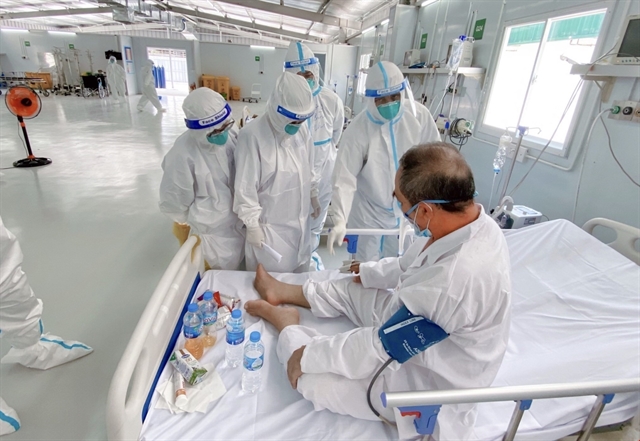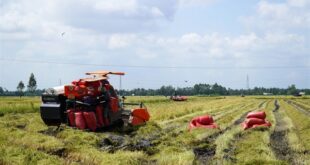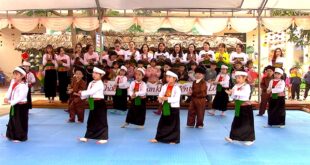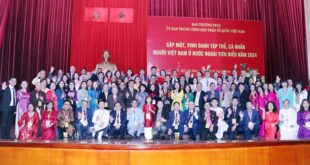
HCM CITY — After recovering from COVID-19, many patients still suffer sequelae or psychological effects.
N.V.T, 28, from Bình Thuận District in HCM City, said he only had a fever for a day when tested positive for SARS-CoV-2 last August.
He quickly recovered from COVID-19. However, he has since suffered unusual symptoms.
“I am often tired, my hair is falling out a lot,” he added.
He also has insomnia every two or three days, he said.
“Sometimes, I have to use sedatives or drink herbal tea to sleep, but I cannot fall asleep like before,” he said.
T.T.O, 38, of Gò Vấp District, HCM City, said when she was infected with SARS-CoV-2, she had a fever for three days and lost her sense of smell, but on the seventh day, she tested negative for SARS-CoV-2.
However, since recovering she has suffered from insomnia, fatigue, shortness of breath, dizziness and terrible headaches, she said.
“I could go upstairs without feeling tired before, but now, after walking up some stairs, I feel out of breath and have to stop,” she said.
“I often feel I don’t have enough oxygen,” she added.
P.V.Q, 47, of Thủ Đức District, HCM City, said it has been more than a month since he recovered from COVID-19.
But now, he often feels tired and gets shortness of breath after working for three or four hours, he said.
“I think the infection is not as scary as the post-COVID-19 period,” he added.
After recovering from the disease, his body feels heavy and the most annoying thing is insomnia, he said.
“I can only get to sleep at 2-3am every day,” he said.
He also felt occasional pain and spasms in his chest.
“I have tried to take more vitamins and do exercise. If the situation does not improve, I will have to go to the hospital for an examination soon,” he said.
Explanation
Nguyễn Như Vinh, head of Respiratory Function Department under the University Medical Centre HCMC, said studies show that COVID-19 not only has a direct impact on patients’ health but also leaves many long-term disorders related to physical and mental health.
The post-COVID-19 syndrome occurs in patients with varying degrees of illness including acute infection, mild or asymptomatic, he said.
The syndrome can appear in many organs and parts of the human body, he said.
It is estimated that there are about 200 symptoms throughout the body. The most common symptom often occurs in the respiratory tract, he said.
Post COVID-19 respiratory symptoms such as dry cough, wet cough, shortness of breath, chest tightness, and lack of oxygen (respiratory failure) can be very mild to very severe depending on the development of the disease when the patients are infected with SARS-CoV-2, he said.
In addition, the lung lesions shown on chest X-rays or CT scans are also diverse, such as pneumonia, pulmonary fibrosis, lung necrosis and bronchiectasis, he said.
The lesions are believed to contribute to the post COVID-19 respiratory symptoms, he said.
Most mild lung injuries or mild symptoms will resolve on their own, he said.
Associate Professor Trần Văn Ngọc, deputy chairman of the Việt Nam Lung Association, said post COVID-19 conditions have left serious and prolonged respiratory sequelae.
Lung damage is sometimes very severe and rapidly progressive causing acute respiratory failure and acute respiratory distress syndrome (ARDS), he said.
Elderly patients with severe underlying medical conditions are at high risk of death, he added.
“Post COVID-19 syndrome can still occur three months after the patient is discharged from the hospital,” he said.
The longer the patients stay at the hospital, the higher the post-COVID-19 sequelae they have, he said.
The older the patient is, the more obvious and prolonged post-COVID-19 sequelae, he said.
Post COVID-19 care
Tăng Chí Thượng, director of HCM City’s Health Department, said the city has faced many challenges in taking care of people’s health, especially those who have recovered from COVID-19.
Local hospitals have received many people with post COVID-19 symptoms such as fatigue, pulmonary sequelae, cardiovascular sequelae and mental disorders, he said.
“It is an issue that needs more attention from the city’s health sector,” he said.
Therefore, the health sector has developed a treatment and healthcare plan for people after COVID-19 in the city, he said.
Specifically, the health sector will strengthen the coordination between Eastern and Western medicine in diagnosis, treatment and health care to proactively detect health problems associated with post-COVID-19 syndrome, he said.
Besides, the coordination will be applied between many aspects, including cardiology, respiratory, neurology, psychiatry, physical therapy, rehabilitation and traditional medicine to treat people after COVID-19, he said.
Moreover, the city is also promoting mental health treatment and care activities for people after COVID-19 at all levels, he said.
It has also set up a call centre to give advice on mental health to people after COVID-19 with support from experts of the Mental Hospital, he said.
Huỳnh Nguyễn Lộc, chairman of the city’s Association of Oriental Medicine, said the association will organise a programme to take care of people’s health after COVID-19 between January 14 and April 29.
In the first phase, the association focuses on taking care of about 6,000 people with meritorious services to the revolution in 22 districts and Thủ Đức City.
In the second phase, it will take care of 6,000 disadvantaged people after COVID-19 infections in the city. The people will receive free medical check-ups, free counselling and screening, free X-rays of heart and lungs, free heart measurement and free ultrasound.
It will also give traditional medicine products for free to a total of 12,000 participants in the programme, he said.
Vinh from the University Medical Centre HCMC said if symptoms still persist four weeks after contracting COVID-19, patients should go to doctors for proper diagnosis and timely treatment.
Patients after recovering from COVID-19 need to improve their health to limit the effects of post-COVID-19 symptoms by drinking a lot of water, eating a lot of vegetables and fruit, doing exercise regularly, practising breathing exercises to strengthen the respiratory system and improving shortness of breath if any, getting enough sleep, and spending more time to rest after work, he said. — VnExpress News
- Reduce Hair Loss with PURA D’OR Gold Label Shampoo
- Castor Oil Has Made a “Huge” Difference With Hair and Brow Growth
- Excessive hair loss in men: Signs of illness that cannot be subjective
- Dịch Vụ SEO Website ở Los Angeles, CA: đưa trang web doanh nghiệp bạn lên top Google
- Nails Salon Sierra Madre
 VnExpress News The News Gateway of Vietnam
VnExpress News The News Gateway of Vietnam





